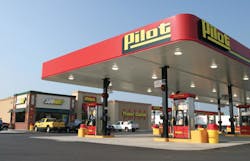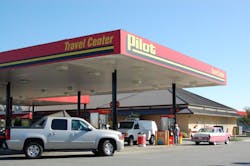But fuel management is also changing for light- and medium-duty fleets, too, with a great many them altering how the ever-so-humble plastic fuel card works.
I talked to Ed Glassman (seen at right), group executive for global commercial products at MasterCard Worldwide, not long ago on this subject and he sees big changes ahead.
A big one to his mind is the growing conversion of fleets from traditional, limited-acceptance, “closed loop” fuel cards to more widely-accepted “open loop” products that allow fleet managers to capture not only various types of fuel spend, but maintenance, parts and supplies, plus fleet services spend as well.
“We feel several factors are driving the increase in open loop fleet products,” he told me, including:
- Fleet management positions are being moved organizationally under purchasing groups that are historically more familiar with open loop products like purchasing and travel card programs
- Fleet managers being tasked with cost reduction initiatives across all fleet spend segments (fuel, maintenance, parts, etc.) and by leveraging open loop fleet card products with ubiquitous acceptance
- Fleet managers tasked to maximize issuer rebates by consolidating multiple spend types onto a single card product, whereas “closed loop” fleet cards can really only be used extensively at fueling locations
- And both fleet managers and purchasing groups trying to benefit from the efficiency of being able to consolidate fuel, maintenance, parts & services, and occasional crew travel onto a single card product
“It’s not enough to simply leverage a closed loop fleet card for fuel discounts any longer,” Glassman explained. “Savvy fleet managers are capitalizing on a host of innovative open loop fleet products to maximize/optimize spend and issuer rebate opportunities across all fleet purchasing segments.”
Of course, drivers have an impact on fuel purchasing and effective fleet management, he pointed out, but the smarter fleets seem to be leveraging GPS and driver communication systems to automatically route drivers to fueling stations where fuel discounts are already in place.“The more sophisticated acceptance networks are even able to dynamically lock out stations that do not provide discounts, and therefore force the driver to only use his/her card at discount sites,” Glassman added.
Shell’s Henry Miller, who works with the Shell Fleet Navigator fuel card aimed at light and sub-Class 6 medium-duty fleets, believes greater control and “data access” is what’s driving the development of new card offerings in this segment of the market.
“The ways in which fleets manage their purchases continues to evolve,” he explained. “What is widely offered in the market today is essentially a universally accepted credit card that fleets can use. Shell’s card is accepted at 95% of fuel stations in the U.S. but goes a step further and uses “Level 3” data that is available at the point of sale systems to a much higher degree than it has been used. That Level 3 data to help fleet managers set appropriate controls for their drivers and enforce company policies.”
Miller noted that fleet managers are constantly looking for new ways to lower costs and increase the efficiency of their fleets, and one way the Shell Fleet Navigator card helps in that task is by allowing customers to capture in-depth data from drivers at the point of sale; this data is then used to set controls that enforce company policies and strategies.“The card can be customized down to the driver level – from what type of fuel each individual driver purchases to how much the driver can spend on maintenance,” Miller said. “Customizable real-time reporting and extensive data analysis allows fleet owners to further customize the card and realize savings.
As a result, fleet cards are continuing to evolve to incorporate sophisticated fleet technology in order to provide the best results for fleet managers.
“Traditional fuel cards’ primary focus is on acceptance at gas stations across the U.S. However, fleet managers are constantly looking for ways to increase the efficiency of their fleets and save on costs,” Miller pointed out.
Now, with the newer generation of cards, “fleet managers can tailor their fuel network to control when, where and what fuel sites their drivers use, and even what type of gasoline they fuel up with,” he said. “With a high level of control and data analysis from purchases, fleet owners can both alter driver behavior and best inform their drivers on how to manage fuel efficiency and realize savings.”
Just goes to show that is anything in trucking’s world can be changed in order to generate more efficiency it will be – even if it’s nothing more than a thin wafer of plastic used at the fuel pump.






